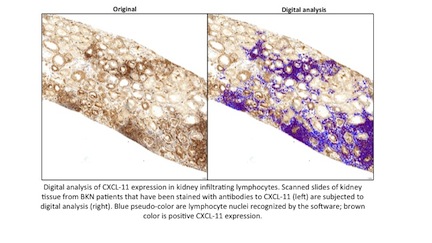Role of Chemokines in Resolution of BK Virus-Associated Nephropathy and Chronicity of Pathology Changes in Kidney Transplant Recipients.
David Geffen School of Medicine at UCLA, Los Angeles, CA
Meeting: 2017 American Transplant Congress
Abstract number: A225
Keywords: Histology, Kidney transplantation, Leukocytes, Polyma virus
Session Information
Session Name: Poster Session A: Kidney: Polyoma
Session Type: Poster Session
Date: Saturday, April 29, 2017
Session Time: 5:30pm-7:30pm
 Presentation Time: 5:30pm-7:30pm
Presentation Time: 5:30pm-7:30pm
Location: Hall D1
BK virus-associated nephropathy (BKN) remains the most common infectious cause of allograft loss after kidney transplantation. We previously demonstrated increased frequency of polyfunctional T cells in patients who control BK virus replication, suggesting the importance of a pro-inflammatory response. We hypothesized that BKN resolution results from a robust initial immune response, and that this could be predicted by measuring levels of the chemokine CXCL11, known to play a role in TH1 leukocyte homing.
Methods: We obtained 19 kidney transplant needle core biopsy specimens preserved in paraffin blocks performed at UCLA medical center from 2003 to 2014 with a diagnosis of BKN under a UCLA IRB-approved retrospective study. Immunohistochemical (IHC) staining was performed with antibodies specific for CXCL11.To quantitate the abundance of these chemokines, stained slides were digitized and areas of inflammation selected for analysis via the Definiens Tissue Studio image analysis software. Statistical analysis was performed using JMP by two-sided t test.
Statistical analysis was performed using JMP by two-sided t test.
Results: CXCL11 expression in lymphocytes ranged from 2.5% to 88.5%. Patients classified as Acute BKN had higher median positive lymphocytes infiltrating compared with those with Chronic BKN (46.7% v. 28.2%, p=0.048). For one patient with sequential samples, the first acute and the second chronic, a decrease was observed (72.3% to 37.8%). There was no statistically significant association between the median positive lymphocytes in patients with return to baseline function (29.4%), chronic renal insufficiency (53.1%), or loss of allograft function (38.6%).
Conclusion: Evaluation of a TH1 cytokine showed increased frequency of lymphocyte positivity in Acute BKN, suggesting that cytokine secretion is important for the pro-inflammatory immune response. Future studies will evaluate the CXCL10 cytokine to evaluate if other TH1 cytokines may be able to predict graft outcomes. These studies may open options for risk stratification at BKN diagnosis, and for developing new therapeutic strategies.
CITATION INFORMATION: Zuckerman J, Palma Diaz F, Magyar C, Abdalla B, Lum E, Bunnapradist S, Pham T, Dannovitch G, Veale J, Gritsch H, Reed E, Schaenman J. Role of Chemokines in Resolution of BK Virus-Associated Nephropathy and Chronicity of Pathology Changes in Kidney Transplant Recipients. Am J Transplant. 2017;17 (suppl 3).
To cite this abstract in AMA style:
Zuckerman J, Diaz FPalma, Magyar C, Abdalla B, Lum E, Bunnapradist S, Pham T, Dannovitch G, Veale J, Gritsch H, Reed E, Schaenman J. Role of Chemokines in Resolution of BK Virus-Associated Nephropathy and Chronicity of Pathology Changes in Kidney Transplant Recipients. [abstract]. Am J Transplant. 2017; 17 (suppl 3). https://atcmeetingabstracts.com/abstract/role-of-chemokines-in-resolution-of-bk-virus-associated-nephropathy-and-chronicity-of-pathology-changes-in-kidney-transplant-recipients/. Accessed February 11, 2026.« Back to 2017 American Transplant Congress
